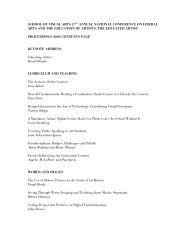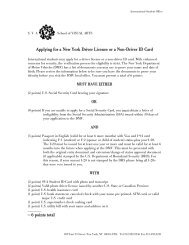SECTION 1 - via - School of Visual Arts
SECTION 1 - via - School of Visual Arts
SECTION 1 - via - School of Visual Arts
You also want an ePaper? Increase the reach of your titles
YUMPU automatically turns print PDFs into web optimized ePapers that Google loves.
(whichever “them” is most handy at the time) and such an admission reinforces the entrenched<br />
fatalism that paralyzes us.<br />
To all this fatalistic abdication <strong>of</strong> responsibility, Socrates says, “nonsense”. Perhaps that’s too<br />
liberal a translation from the Greek. What he did say though (which roughly translates to<br />
“nonsense”) is, “what a society values, that it will cultivate”. Read carefully; he didn’t say<br />
society would try to cultivate its values or make a sincere effort to cultivate its values. He said it<br />
would cultivate those values, period. Basically, Socrates would have very little patience with the<br />
pseudo-reform movements in education because they are mere movements <strong>of</strong> subterfuge<br />
designed to cover the fact that what we have is really what we want. If we didn’t want it, we<br />
wouldn’t have it. What we have has been scrupulously cultivated and is therefore the product<br />
<strong>of</strong> what we value. If we valued something different badly enough, we would cultivate something<br />
different. This stage <strong>of</strong> fatalism in colleges <strong>of</strong> education is a caricature <strong>of</strong> the oldest medical<br />
joke in history—the patient says to the doctor, “it hurts when I do this”, to which the doctor<br />
replies, “well stop doing that”. We in education bemoan our fate, and talk about all the things<br />
that don’t work. To which any sensible observer would remark, “well stop doing those things<br />
and try something else” (having colleges <strong>of</strong> education begin a civilizing dialogue with our<br />
future teachers concerning the fine arts and humanities would certainly seem to fit this call to<br />
“try something else” quite nicely). But the call to try something else is usually met with a sigh<br />
and a mumbled reply stating, but “they” won’t let us.<br />
Proceeding ever downward to the uncivilized existential vacuum from planlessness, to fatalism,<br />
we now encounter the third stage—conformism. Colleges <strong>of</strong> education are uncommonly fond <strong>of</strong><br />
pseudo-intellectual fads. From new math, to whole language, to assertive discipline, to learning<br />
styles, to right brain/left brain thinking, to transformational grammar, to cooperative learning,<br />
the list goes on and on. Perhaps many <strong>of</strong> these fads have worthwhile pieces to add to a quality<br />
educational experience for our future teachers. But rarely are they treated as the potential<br />
minor step in the right direction, which surely could be their only claim. Rather, they are<br />
treated as some sort <strong>of</strong> magical panacea that will instantaneously transform colleges <strong>of</strong><br />
education into an intellectual Valhalla if only enough disciples will convert and conform to<br />
whatever fad is popular at that moment. An astute observer would note that it is rare when<br />
such clarion calls for converts are not rewarded with conforming multitudes. Books will be<br />
written, workshops will be held, and Continuing Education credits will be <strong>of</strong>fered to all who<br />
will embrace whatever fad has gained momentary popularity. After a brief period <strong>of</strong> time, the<br />
disciples will wander <strong>of</strong>f, blank faced, in search <strong>of</strong> the next pseudo-intellectual epiphany, and<br />
one is reminded <strong>of</strong> the Miltonic quote so frequently repeated by Robert M. Hutchins, “the<br />
sheep look up, but are not fed” (1968, p. 115).<br />
When caught in this web <strong>of</strong> conformity, Frankl (1975) noted that we publicly (and<br />
institutionally) echo Schopenhauer’s admonition that “we seem eternally condemned to<br />
vacillate between the two extremes <strong>of</strong> want and boredom” (p. 169). We are like children in that<br />
we see a new toy, and we can’t live without it. We know that when we get it, we will be fulfilled<br />
and happy. But after ten minutes with the new toy, we realize that it really wasn’t what we<br />
wanted after all, and so we search for a new magic toy to enchant us. Such shallow<br />
enchantment is always ephemeral, and it never quite satisfies as we thought it would. We want,<br />
we get, we become quickly bored with our new found fad and then, “herdlike”, we move <strong>of</strong>f in<br />
search for the next educational salvation just appearing on the horizon (trust me, there’s always<br />
one there).<br />
13








